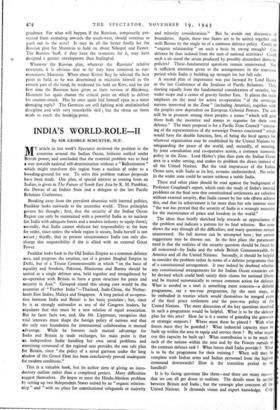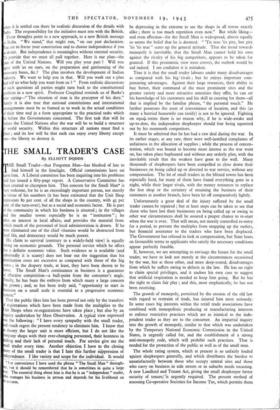INDIA'S WORLD-ROLE II
By SIR GEORGE SCHUSTER, M.P.
MY article in last week's Spectator reviewed the position in the countries around the Indian Ocean, hitherto unifftd under British power, and concluded that the essential problem was to find a way towards national self-determination without a " Balkanisation " which might transform this region from a nucleus of order to a
breeding-ground for war. To solve this problem various proposals have been made. One plan, of special interest as coming from an Indian, is given in The Future of South East Asia by K. M. Panikkar, the Dewan of an Indian State and a delegate to the last Pacific Relations Conference.
Breaking away from the prevalent obsession with internal politics, Panikkar looks outwards to the uncertain world. Three principles govern his thought ; first, that the security of the Indian Ocean Region can only be maintained with a powerful India as its nucleus (an India with adequate forces and a modern industry to equip them); secondly, that India cannot abdicate her responsibility as the base for order, since unless the whole region- is secure, India herself is not secure ; thirdly, that in present circumstances India can only dis- charge this responsibility if she is allied with an external Great Power.
Panikkar looks back to the Old Indian Empire as a common defence area, and proposes the creation, not-of a greater Moghul Empire in Delhi, but of a Triune Commonwealth in which "on the basis of equality and freedom, Pakistan, Hindustan and Burma should be united as a single defence area, held together and strengthened by co-operation with Britain to form a great structure for peace and security in Asia." Grouped round this strong core would be the countries of "Further India "—Thailand, Indo-China, the Nether- lands East Indies, Malaya and Singapore. A long period of co-opera- tion between India and Britain. is his basic postulate ; but, since he is as strongly nationalist as any of the Congress leaders, he stipulates that this must be a new relation of equal association. But he faces facts too, and, like Mr. Lippmann, recognises that vital interests must shape the foreign policy of nations and that the only sure foundation for international collaboration is mutual advantage. While he foresees such mutual advantage for India and Britain in trade exchanges, his main point is that an independent India handling her own naval problems and exercising command of the regional seas provides the one safe plan for Britain, since "the policy of a naval garrison under the long shadow of the Grand Fleet has been conclusively proved inadequate
for modern conditions." • This is a valuable book, but its author aims at giving an intro- ductory outline rather than a completed project. Many difficulties suggest themselves. He hopes to meet the Hindu-Moslem problem by setting up two ihdependent States united by an "organic relation- ship" and "with no place for constitutional safeguards or majority and minority considerations." But he avoids any discussion of boundaries. Again, these two States are to be united together and with Burma by the single tie of a common defence policy. Could an "organic relationship" on such a basis be strong enough? Can defence be thus isolated from the sum of national activities? Could such a tie stand the strain produced by possibly discordant domestic policies? These- fundamental questions remain unanswered. Nor is sufficient attention given to the arrangements in the transition period while India is building up strength for her full role. • A second plan of importance was put forward by Lord Halley at the last Conference of the Institute of Pacific Relations. This, starting equally from the fundamental consideration of security, has wider scope and a centre of gravity further East. It places the main emphasis on the need for active co-operation "of the sovereign nations interested in the Zone" (including America), together with the peoples now dependent on European Colonial Powers. The aim will be to promote among these peoples a status "which will give them both the incentive and means to organise for their own defence." The main proposal is for a Pacific Zone Council " consist- ing of the representatives of the sovereign Powers concerned" which would have the double function, first, of being the local agency for whatever organisation may be established by the United Nations for safeguarding the peace of the world, and, secondly, of securing, by joint consultation and co-operative action, a common economic
policy in the Zone. Lord Hailey's plan thus puts the Indian Ocean area in a wider setting, and makes its problem the direct interest of all the United Nations. But the vital impormace of the Indian Ocean area, with India as its key, ranains undiminished. No order in the wider zone could be secure without a stable India.
These and other plans should be read against the background of Professor Coupland's report, which ends the study of India's internal problems on the final note that constitutional settlements are valueless without external security, that India cannot by her sole efforts achieve this, and that its achievement is far more than her sole interest since "the war has proved that the security of India is a strategic necessity for the maintenance of peace and freedom in the world."
The ideas thus briefly sketched help towards an appreciation of the problem and indicate a pattern for its final solution. But none shows the way through all the difficulties, and many questions remain unanswered. No full answer can be attempted here ; but certain suggestions may be thrown out. In the first place the paramount need is that the realities of the security question should be faced by all concerned—by India and the whole British Commonwealth, by America and all the United Nations. Secondly, it should be helpful to consider the problem rather In terms of a definite programme than of a constitutional arrangement. It may indeed be doubted whether any constitutional arrangements for the Indian Ocean countries can be devised which could both satisfy their claims for national liberty and be trusted automatically to ensure common action for defence. What is needed as a Start is something more concrete—a definite -programme, say a ten-year programme, for the next steps, to be embodied in treaties Which would themselves be integral parts of the final peace settlement and the post-war policy of the United Nations. The mere discussion of the key questions involved in such a programme would be helpful. What is to be the defence plan for this area? How far is it a matter of guarding the .gateways or strategic outposts ? Where must these be placed ? With what forces must• they be guarded ? What industrial capacity Must be built up within the area to equip and service them ? By what stages can this capacity be built up? What contribution is to be made by each of the nations within the area and by the Powers outside to the common defence task ? What forces shall India provide ? What is to be the programme for their training ? When will they be complete with Indian arms and Indian personnel from the highest command downwards? How is the transition period to be handled?
It is by facing questions like these—and there are many more— that we can all get down to realities. The details must be settled between Britain and India ; but the strategic plan concerns all the United Nations. It demands vision and expert knowledge. Only hen it is settled can there be realistic discussion of the details with ndia. The responsibility for the initiative must rest with the British. These thoughts point to a new approach, to a new British message India. "We stand," that might run, "on our past declaration. ou are to frame your constitution and to choose independence if you desire. But independence is meaningless without external security. o provide that we must all pull together. Here is our plan—the tan of the United Nations. Will you play your part ? Will you gree with-us on ours, on the preparation and garrisoning of the ecessary bases, &c.? The plan involves the development of Indian dustry. We want to help you in that. Will you work out a plan d tell us what help You want from us ? " From realistic discussions f such questions all parties might turn back to the constitutional roblem in a new spirit. Professor Coupland reminds us of Burke's se saying—" The situation of man is the preceptor of his duty." urely it is also true that national constitutions and international rangements must be so framed as to work in the actual conditions f their time and in a form appropriate to the practical tasks which 'e before the Governments concerned. The first task that will lie efore the United Nations after the war will be to build a structure world security. Within this structure all nations must find a ace ; and its law will be that each can enjoy every liberty except ne-the liberty to destroy it.



























 Previous page
Previous page